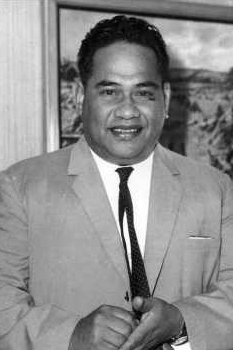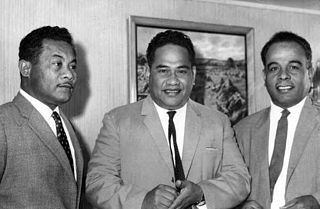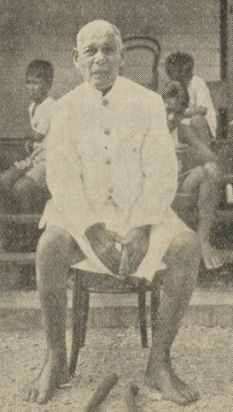
Hammer DeRoburt was the first President of the Republic of Nauru,and ruled the country for most of its first twenty years of independence.
Lagumot Gagiemem Nimidere Harris was a political figure from the Pacific nation of the Republic of Nauru,and served as its President. He was a cousin of RenéHarris.

Timothy Detudamo was a Nauruan politician and linguist. He served as Head Chief of Nauru from 1930 until his death in 1953.
Kenas Aroi was a Nauruan political figure. He was President of the Republic of Nauru from 17 August to 12 December 1989.
Kennan Ranibok Adeang was a Nauruan politician who served as President of Nauru for three separate periods during the late 20th century. Born in Nauru,and educated in Australia,including at the Australian School of Pacific Administration,Adeang was first elected to the Parliament of Nauru in 1971,representing the seat of Ubenide,and became a noted opponent of Hammer DeRoburt,the country's first president. He first became president in 1986,serving two short terms at the end of that year. In the following year,1987,Adeang was involved in the establishment of the Democratic Party of Nauru,one of the first political parties in Nauru. He again served as president in late 1996,but lost power after a motion of no confidence. Adeang was active in parliament until 2000,serving at various times in the Cabinet,and also as Speaker from February 1997 to December 1998. In 2007,he was appointed High Commissioner to the Republic of Fiji,serving in the position until his death in 2011. His son,David Adeang,also served in the Nauruan parliament,occupying the same constituency as his father.

Raymond Gadabu was a Nauruan politician who served as Head Chief between 1953 and 1955.

Parliamentary elections were held in Nauru on 23 January 1971. As there were no political parties,all candidates ran as independents. Following the election,Hammer DeRoburt was re-elected president by members of the Parliament.

Parliamentary elections were held in Nauru on 18 December 1976. Following the election,Bernard Dowiyogo was elected President by Members of the Parliament.

Early parliamentary elections were held in Nauru on 12 November 1977,after Parliament had been dissolved by President Bernard Dowiyogo due to a sustained campaign against the government led by former President Hammer DeRoburt,who had been voted out of office the previous year. Particular controversy had been caused by the Supply Act passed in June,and Dowiyogo stated that elections would be held to give him a mandate. After Parliament failed to approve the budget,Dowiyogo asked Speaker David Gadaroa to dissolve the legislature.

Parliamentary elections were held in Nauru on 6 December 1980. As there were no political parties,all candidates ran as independents. The election was won by supporters of President Hammer DeRoburt,who re-elected him President on 9 December.

Parliamentary elections were held in Nauru on 3 December 1983. As there were no political parties,all candidates ran as independents. Following the election,President Hammer DeRoburt was re-elected by ten votes to six.

Elections for the Legislative Council for the Territory of Nauru were held for the first and only time on 22 January 1966.

Elections for a Legislative Assembly were held in Nauru on 26 January 1968.
Buraro Robidok Bagewa Detudamo was a Nauruan politician. He was the only son of Timothy Detudamo and brother-in-law to Kennan Adeang. When Buraro was a boy,his family went to Chuuk Islands.

Daimon was Head Chief of Nauru from 1920 until 1930. His 42 years as a chief was a record length of service.

Austin Bernicke was a Nauruan politician. He was a member of the first Local Government Council in 1951,then a member of Parliament after it was established in 1966,serving until his death in 1977. He also served as a cabinet minister from 1968 until 1976.

Joseph Detsimea Audoa was a Nauruan politician. He served as a member of the Parliament of Nauru and its predecessors from 1955 until his death and was a cabinet minister for much of the period 1968 to 1983.
Samuel Edwin Tsitsi was a Nauruan politician.
The Nauru Local Government Council was a legislative body in Nauru. It was first established in 1951,when Nauru was a United Nations trust territory,as a successor to the Council of Chiefs. It continued to exist until 1992,when it was dissolved in favor of the Nauru Island Council.
Parcelle James Dedagunmon Bop was a Nauruan politician.







